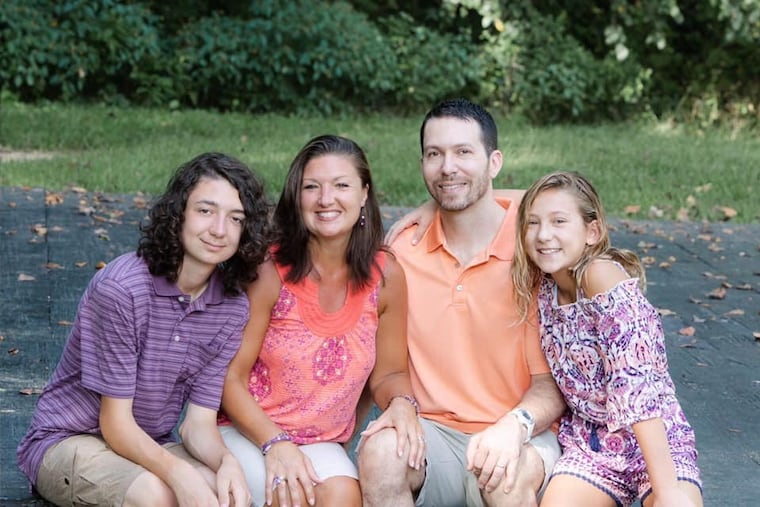Adult ADHD is hard on a marriage, but there’s help for couples
West Chester-based sex therapist and psychologist Ari Tuckman, author of "ADHD After Dark: Better Sex Life, Better Relationship," says that getting help for the condition is virtually an aphrodisiac for many couples.

When Denise and Chris Marino got married 21 years ago, they had no idea of the struggles ahead. Within a few years of the wedding, the young Downingtown couple were headed for divorce.
Chris’ mood was all over the place for reasons he couldn’t explain. Denise thought that he was more interested in his latest home improvement project than he was in her.
His mother, who worked with school-aged children, wondered whether her son might be dealing with a problem more often associated with little kids than grown men.
» READ MORE: ADHD in women: A lifetime of frustration, its cause easily missed
Sure enough, mom was right. At age 30, Chris was diagnosed with ADHD -- attention deficit hyperactivity disorder.
ADHD is a neurodevelopmental disorder characterized by inattention, impulsivity, and hyperactivity out of step with a person’s age. It’s highly manageable with behavioral interventions, educational support, and medication, according to Bob Cattoi, CEO of CHADD (Children and Adults with Attention-Deficit/Hyperactivity Disorder), which provides education, training, and resources for people with ADHD and their families.
After his diagnosis was confirmed, Chris started taking an extended-release form of Ritalin, a stimulant drug that works on parts of the brain that control hyperactivity and impulses. Now 45, he recalls that the change was “instantaneous. I was able to think straight and use the behavioral strategies that help you organize your thoughts,” he said.
The diagnosis saved the Marinos’ marriage — though it took a while for Denise to recover from the collateral damage of having an ADHD spouse.
“It took a really, really long time to realize that it wasn’t me — that there wasn’t something wrong with me — that I wasn’t at fault in him not paying attention to me,” Denise said.
Chris Marino is among the 11 million U.S. adults with ADHD. And seven million children have the disorder.
But when ADHD first surfaces in adulthood, as the Marinos discovered and a recent JAMA study confirmed, couples often struggle because of tensions that arise over symptoms of the disorder. That makes West Chester-based sex therapist and psychologist Ari Tuckman’s new book, ADHD After Dark: Better Sex Life, Better Relationship, not only timely, but for some couples, essential.
Tuckman compiled a 72-question survey “not just to collect information, but also to spark interest and conversation about the topic,” he said. He recruited respondents through ADHD education platforms such as podcast interviews, websites, webinar presentations, and email newsletters. His friends in the ADHD community also helped spread the word, so the participants are representative of those who look for information online, not of the general population.
Of the more than 3,000 respondents, 1,263 were women with ADHD, 1,051 were women without the condition, 673 were men with ADHD, and 196 were men without it. Most of the people who completed the survey were in their 30s, 40s, or 50s. Questions ranged from “To what extent do you feel that treatment overall has been effective in managing your or your partner’s ADHD symptoms?” to “How often have you and your partner engaged in sexual activity together this past month?”
Key findings included the insight that managing ADHD well could be an aphrodisiac. Those who thought that their partners put in the most effort at managing their own or their partner’s ADHD had almost twice as much sex as those couples for whom who felt that their partner put in the least effort.
Also, most people rated their own effort at managing their ADHD or their partner’s as greater than their partner’s effort. However, those who thought that their partner put in more effort also put in more effort themselves.
Gender mattered, too. The heterosexual couples in which the woman had ADHD were somewhat happier and had sex 25% more often than the couples in which the man had ADHD.
“If the man has ADHD, the woman tends to pick up the slack, but if the woman has ADHD, she will struggle and keep more of that burden on herself,” Tuckman said. “This is where both partners need to put in effort to work better together on matters of ADHD that can help turn that tide, that angry parent-child dynamic. One of my survey respondents called it a ‘sex killer.’ It’s also a relationship killer.”
The worst-case scenario is the man who has ADHD and ”feels he can never get it right,” so he gives up on trying to improve the relationship, Tuckman added. “And [his partner] feels she’s always angry. She’s stressed; she feels like she has to take care of everything. She’s not wrong.”
But even for these couples, there’s hope through diagnosis and treatment, Tuckman and Cattoi said.
Of those who are diagnosed with ADHD in childhood, about 60% will have significant issues as they get older, Cattoi said. Still, “it’s a very manageable problem through a multimodal treatment approach with not everybody needing medication.”
Tuckman found that, contrary to what he expected, medication itself didn’t necessarily help the partners with ADHD focus more on their partners during sex. “For most people, where medication was helpful was in managing life before sex,” which wound up making sex more likely in the long run, Tuckman said.
“For the couples where one partner is just now being diagnosed and treated, it can feel like a wiping of the slate and a fresh start,” Tuckman added. “Undiagnosed ADHD makes both partners feel powerless. … Neither partner feels good about how they are acting, yet neither is able to change it.”